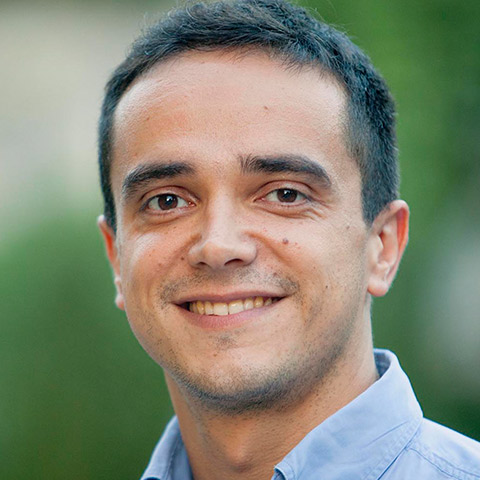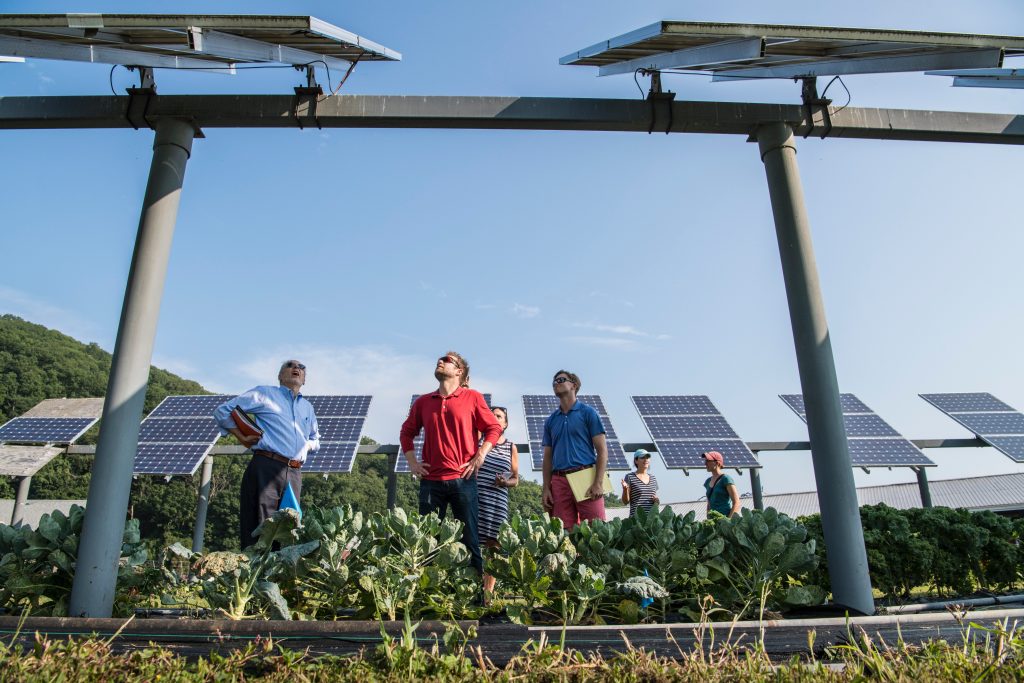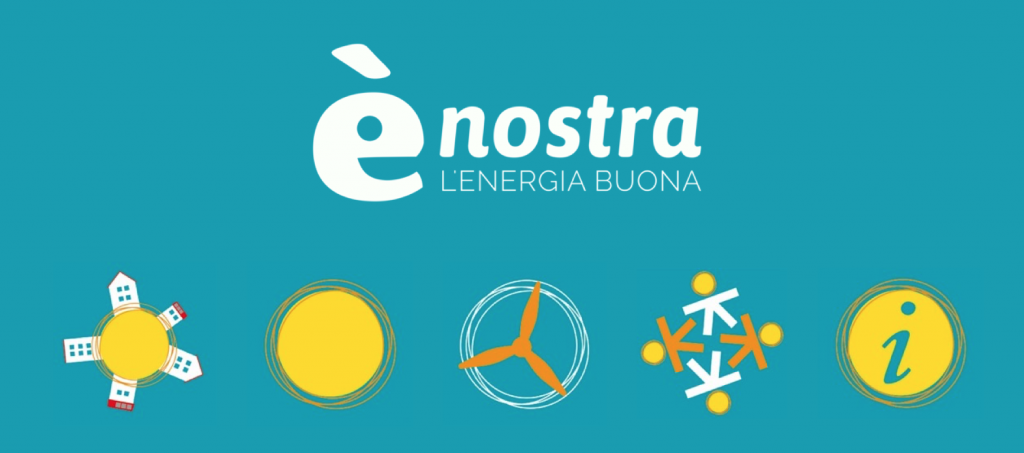Renewable energy cooperatives: the case of ènostra
Community-led renewable energy initiatives
Citizens taking the initiative: two case studies of community-led renewable energy initiatives
by Stefano Verde and Nicolò Rossetto (FSR)
This second installment of the Topic of the Month on community-led renewable energy initiatives presents an interview with Sara Capuzzo and Gianluca Ruggieri, respectively president and vice-president of the Italian renewable energy cooperative ènostra.*
Founded in 2014, but with its origin dating back to 2008 (when Retenergie, a small RES cooperative, started generating electricity), ènostra is the first not-for-profit and democratic RES electricity supplier in Italy. It currently counts about 6000 members and, in terms of energy volumes, it sold 13.5 GWh in 2019 (+56% compared to 2018). While these numbers are very small relative to the scale of the whole energy system, ènostra is the most relevant community-led RES initiative in Italy.
With reference to the different existing types of RES communities (broadly intended and, hence, independent of the legal definitions set by the Clean Energy Package), ènostra is a representative example of the cooperative model (Huybrechts and Mertens, 2014). In Europe, electric cooperatives have a history that begins as early as the end of the 19th century. The birth and the features of modern RES cooperatives, however, closely depend on their context (Hicks and Ison, 2018). Notably, the ascent of distributed generation technologies and growing environmental concerns are common driving forces that, over the past three decades (with temporal differences across countries), led to this new generation of cooperatives and other RES communities. From the perspective of the energy system as currently organised (and captured by our taxonomy of RES communities), RES cooperatives do not represent a novelty or pose any special challenge, as their internal organisation bears no implications for the activities of electricity generation, supply, aggregation, etc. Rather, their main innovative element lies in the objectives that they pursue, which involve attaining benefits not only for their members but also for the wider community.
The recent Clean Energy Package is a landmark for the future development of energy communities, as for the first time these collective agents receive full recognition at the EU level. Direct effects of the Clean Energy Package on RES cooperatives can be expected to be limited because the legal definition of Renewable Energy Communities (RECs) includes the requirement of geographical proximity between the community members (and hence only small RES cooperatives may qualify as RECs). Nevertheless, large RES cooperatives will likely evolve as a consequence of the new legislation, by partnering in new models with RECs. For example, local collective-self consumption operations may see the participation of RES cooperatives as supplier, which indeed is something that in some countries is already happening.
The interview below explores the case of ènostra at this particular time.
Who are the founders of ènostra and what were their motivations for creating the cooperative?
ènostra is a product of REScoop 20-20-20, a European project which also led to the creation of other organisations such as REScoop.eu, the European federation of RES cooperatives, and Coopérnico, a RES cooperative in Portugal. ènostra was founded in 2014, following a workshop that brought together about 40 people active in the area of community renewable energy in northern Italy. The founders of ènostra are four legal entities: Avanzi, a company promoting social innovation; EnergoClub, a non-profit association promoting grassroots initiatives for the energy transition; Retenergie, a RES production cooperative; and ForGreen, a RES production company, which however left within a year or so as being interested in pursuing a more business-oriented activity. Most of the initiators were between 35 and 50 years old. They tended to be highly educated, with degrees in engineering, social and natural sciences, and with a strong personal interest in topics related to society, the environment and ethics. Only one of the first five board members was a woman, but otherwise, gender balance has always been good among the wider staff.
The challenge was creating something that did not yet exist in Italy: a cooperative selling electricity. The goal was – still is – to contribute to reducing the environmental impact of electricity production and consumption in Italy by increasing the share of renewables in the national energy mix. While mainly animated by environmental and other value-based motivations, we also wanted to establish an economically sustainable activity (not-for-profit), not a charity or association. It did not take us long to realise, also observing analogous experiences in Europe, that we needed to expand our activity from only selling RES electricity to also producing it. Indeed, we realised that you can only hope to make an impact on the energy system if you contribute to production. This is the rationale for the subsequent merger with Retenergie, which had been producing (but not selling to end-users) RES electricity since 2008.
What are the socio-demographics of ènostra’s members and their motivations for joining the cooperative? Has there been an evolution over the years? Have many members left the cooperative?
There are four main categories of members and related motivations: 1) people from ethical purchasing groups, thus primarily motivated by ethical consumerism; 2) environmental activists; 3) people interested in social innovation; and 4) people interested in technological innovation in renewables and energy efficiency. Over the years, however, a growing number of people have joined the cooperative not only for idealistic reasons, but also with the hope to derive some economic gains. While ènostra’s electricity prices are not particularly competitive in that they are aligned to those of the Italian default tariff for residential customers (Maggior tutela), the additional services offered to our members may be more clearly attractive. Also, last year, we observed that many people new to the cooperative contributed to our crowdfunding for a new windmill in southern Italy. So far, very few people have left ènostra, not more than a few dozens in total, and usually for personal reasons rather than dissatisfaction with the cooperative.
Our members are prevailingly middle-aged, concentrated in the area of Milan and in northern Italy more generally. We have no information on their economic status, but we sense that there is not a prevalence of high-income or low-income households. The same applies for their education level. By contrast, there seems to be a prevalence of members with leftist worldviews, as reflected in their strong sensitivity to issues relating to social justice, human rights, etc., but this has never translated in any official position or statement by the cooperative on specific political questions.
What contextual factors favoured the birth of ènostra? Has the development of the cooperative been influenced by any exogeneous factor?
ènostra was created at a difficult time for the renewables sector in Italy, just after the termination of the main feed-in-tariff scheme for photovoltaic generation. Paradoxically, however, the lack of policy support was a trigger for the birth of ènostra. Without feed-in tariffs, we had to be more ambitious than we could have afforded to be otherwise. This means that it would only make economic sense to attempt starting a cooperative with, say, 5000 members rather than 30 or 50. Indeed, in Italy, most small collective RES producers comparable to Retenergie barely survived those years. Subsequently, regulatory uncertainty, regarding, e.g., the exact rules for accessing public support and various authorisation processes, has been the main exogenous factor having a negative impact on the cooperative. If you are in the renewables sector in Italy, you need to be able to cope with regulatory uncertainty and adapt to contingencies.
What are the main costs and benefits of joining the cooperative?
The costs of membership are minimal. The cost of becoming a member of ènostra is €50, which is the value of two of its shares (returned if and when the person leaves the cooperative). Electricity supply contracts with ènostra are activated together with the membership of the cooperative. As already said, ènostra’s electricity prices are aligned to those of the Italian default tariff for residential customers. Concerning the benefits, firstly, it is our ambition to offer in the future lower electricity prices to our members as a function of the growth of the cooperative, once standing economic losses are fully recovered. Secondly, our members can avail of economically convenient consulting services for their own investments in energy efficiency or photovoltaic generation (note that the cooperative has a margin on these services, which means energy efficiency improvements are in its own interest). Some discounts tied to specific commercial partnerships are offered too. Importantly, ènostra gives all citizens the opportunity to directly participate in the energy transition. Finally, the cooperative carries out activities that also bring benefits to the broader community. For example, it has started delivering training courses for social operators targeting energy poverty as well as awareness-raising campaigns on climate change.
What are the costs and benefits of ènostra for society?
The value of ènostra for society is high. We promote a model that safeguards the final consumer, increases renewable energy, facilitates active consumption and self-consumption, and helps those who have difficulty paying their electricity bills. We are of course a very small actor in the Italian system, as we make up less than 0.01% of total electricity sales. However, we manage to exert a positive influence on bigger actors, pushing them to revise their business models. Importantly, we are able to engage with associations or other organisations that oppose new RES projects in their proximity and to agree with them on alternative solutions. We thus contribute accelerating the energy transition through increased social acceptance of RES projects with reduced undesirable effects on the local environment. We can do this thanks to our credibility and the patience of our investors, as it does make a difference whether you need to ensure a 2-4% return on investment or a 10% return. We also contribute to accelerating the transition through our consulting services and hopefully, as soon as the relevant regulation is fully defined, by facilitating the birth of local renewable energy communities.
What are the main challenges that you have faced so far?
Many and diverse challenges have been encountered over the years. Starting from scratch was not easy. The learning curve was very steep at the beginning, as none of us had ever sold electricity before or had professional experience in many of the related activities, such as issuing bills or taking out social loans. As an electricity supplier, we must comply with many legal and bureaucratic obligations (despite the exemptions accorded to small suppliers). Much volunteering work and generosity were needed to get the whole thing started. Financially, the cooperative was initially endowed with a capital of €6000 from the founding organisations and some additional funds from REScoop 20-20-20. And it was not until 2016, with the sale of electricity, that we started to have revenues – we expect to finally break even in 2020. Coordination of all the activities carried out by the cooperative has proved challenging too, especially during phases of sustained growth in the number of members.
How does ènostra compare with similar organisations in Europe? Has anything been missing for matching the success of, say, Ecopower or SOM Energia?
Though it is only a few years older than ènostra, SOM Energia has been for us a model to follow, a guiding light. Today, the Catalan cooperative has as many as 65,000 members. Initially, they relied entirely on volunteering work and have been exceptionally good at making the cooperative grow and managing it well through the transition. SOM Energia was created in response to a sudden stop to incentives for renewable energy in Spain and in close connection with the Catalan political context. Indeed, their politicization both characterises the cooperative and is a factor of its success. By contrast, ènostra did not have a particularly favourable political context nor has it ever had a specific political orientation.
That of Ecopower is also a very successful story. We do not know as much about the genesis of Ecopower, but a strong cooperative culture in Belgium, stronger than in Italy, especially these days, was of help. Compared to other similar cooperatives, a peculiar characteristic of ènostra is its broad ethical approach (extending beyond the concern for the environment), whereby, for example, we do not consider producing or selling electricity from photovoltaic plants on agricultural land or from windmills not welcome by local communities.
Over the next five to ten years, what types of RES community models are likely to thrive and how do you see ènostra developing?
High expectations are on local renewable energy communities, notably those taking the form of collective self-consumption operations. In principle, if it can be demonstrated that collective self-consumption operations reduce transmission costs, then they should be entitled to reduced network tariffs. Under this condition (again, to be proved), there is a massive potential for largely autonomous areas producing, storing and distributing electricity, with a new role for DSOs. While being a national actor, ènostra will act as an enabler of energy citizens and local communities in renewable production and collective self-consumption initiatives. However, we observe major actors pushing in the direction of different models.
As concerns ènostra’s prospects, our hope is to grow very strongly in the volumes of sold and self-generated electricity, but also in the services offered and visibility. Today, about 20% of the electricity we sell is either produced by us or by our selected partners (the rest being bought on the wholesale market with a guarantee of origin). We would like to increase this 20% share up to 100% by 2021. Also, we would like ènostra to become a second-level cooperative, meaning one that facilitates other cooperatives and RES communities coming to life and thriving. In expectation of this expansion of our activities, ènostra’s executive board has been enlarged (from five to seven members), bringing in new competencies and experimenting with a more efficient way of working while preserving our values and identity.
Exogenous factors that may have positive or negative consequences for the fulfillment of our ambitions include, firstly, the transposition of the Clean Energy Package into national legislation and, secondly, the phase-out of the Italian default tariff for residential customers, as many customers will have to choose a new supplier and might then decide to join ènostra.
Do you see any risk for RES communities in the transposition of the Clean Energy Package into national legislation?
The Clean Energy Package potentially offers major opportunities for RES communities and the wider energy system, but there are risks as well. Notably, there is a risk that too many constraints are imposed, starting from the legal definition of a RES community (something that has to be finalised by the Member States), which would have the effect of hindering related investments. On the other hand, too lax a definition would be problematic too. We saw it two years ago, in Germany, how such a flaw could seriously penalise RES communities. On that occasion, there was a call for tenders for installing new wind capacity in which community projects would be prioritised. 45 out of 46 of the winning bids were community projects according to the rules of the tender. As it turned out, however, the vast majority of those projects were in fact not led by genuine communities. Clearly, this should not happen again.
* The Florence School of Regulation would like to thank Fondation Tuck for its financial support to the FRESCO project.







